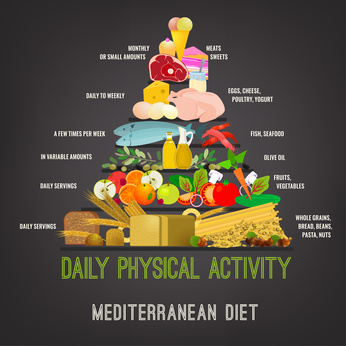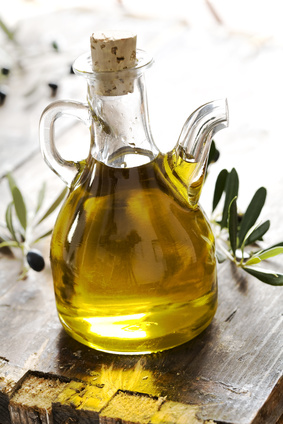
The Mediterranean Diet is a broad term that encapsulates the eating habits of countries along the Mediterranean Sea. It’s also a buzzword in the health community – you’ve likely heard of many studies linking the Mediterranean diet to a variety of anti-aging benefits like brain health and cancer prevention.
Many studies have been performed on the Mediterranean Diet. And those findings are typically very positive, with very few adverse effects noted by researchers.
To put that in context, the Paleo Diet is ranked 36th healthiest out of 38 eating plans ranked by U.S. News. And the Mediterranean Diet? It’s an impressive second out of all diets reviewed. Only the DASH Diet fared better.
What is The Mediterranean Diet?
We should probably clarify a few things before going further: there is no ‘official’ Mediterranean Diet. This isn’t Jenny Craig – the Mediterranean Diet is a collection of foods and eating patterns primarily in Greece, Italy, Spain and southern France. That’s typically fish, fruits, vegetables, beans, high fiber breads, whole grains and nuts.
That and plenty of olive oil. Folks can’t get enough of that in this region where enjoyment of eating is eclipsed only by enjoyment of the company of others.
Meat, cheese and sweets are limited in the Mediterranean Diet. They’re replaced with foods high in monounsaturated fats, fiber and omega-3 fatty acids. Roughly 35%-40% of Mediterranean Diet calories come from fats. They’re healthy fats though, with much of those coming from unsaturated oils like olive oil, fish oil, soybean or flaxseed oil.
It’s also rich in nuts, like walnuts, hazelnuts and almonds – all of which appear to have a protective effect on the heart.
The Mediterranean Diet and Your Brain
The Mediterranean Diet may lower your risk of Alzheimer’s disease. That’s the consensus of a new study that followed 400 adults between ages 73-76 over three years.
During this time, researchers took MRI scans of the volunteers to analyze overall brain volume and thickness of the cortex.
Among their findings: they found subjects who followed the Mediterranean Diet, or an eating plan close to it, were less likely to lose brain volume with age.
This finding builds on earlier research, including a study done in 2015, that links the Mediterranean Diet to brains aging about 5 years slower than people who ate more conventional diets. In that study, researchers looked at the brains of 674 people with an average age of 80. They asked each of these volunteers to list what they’d eaten over the past year.

The researchers then scanned their brains and found volunteers that followed an eating plan similar to the Mediterranean Diet had heavier brains with more brain and white matter.
The 2017 study allowed researchers to gauge differences in brain volume over three years – something the 2015 study did not permit. As well, it allowed them to look at two features of the Mediterranean Diet, fish and meat consumption, neither of which affected brain-aging in the study.
The findings suggest that the Mediterranean Diet works as a whole rather than pieces of it. For example, the combination of nutrients may protect against vascular disease and inflammation, which can lead to brain shrinkage.
It’s also important to remember that what’s good for the brain is good for the heart. Consider this study, which links the Mediterranean Diet to lower risk of heart disease for proof of that.
The Mediterranean Diet and Weight Loss
The Mediterranean Diet may also help with weight loss. Granted, it may be slower weight loss than you’d see with a crash diet. But slow and steady tends to win the raceThe Mediterranean Diet is characterized by smaller portions, eaten more often. Stick with it, and you may find weight stays off longer than it would with another eating plan.
A study published in the journal The Lancet found that people who ate similar to the Mediterranean Diet, with high levels of nuts and olive oil, lost more weight than volunteers on a low fat control diet.
While you may lose weight with the Mediterranean Diet, it’s important to remember that it’s not without challenges. You’d be looking at roughly eight to ten servings a day for fruits and vegetables. Most Americans struggle to meet the basic U.S. dietary guidelines of five to seven daily servings.
With ‘a serving’ being roughly the size of your fist, that could be an adjustment for you if this is a road you’d like to explore.
A Mediterranean Diet Food List
There is no ‘official’ Mediterranean Diet. That said, the fundamentals of this style of eating are the same: low sodium, high unsaturated fats, fish, fruits and vegetables. The Mediterranean Diet means you would:
Eat a Variety of Fruits and Vegetables Every Day – Grapes, blueberries, tomatoes, broccoli, figs, olives, spinach, eggplant, beans, lentils and chickpeas are all on the table – literally. Aim for fruit and/or vegetables so you’ve got one for each color of the rainbow.
Eat Plenty of Whole Grains – Sorry William Davis, but the Wheat Belly theory doesn’t hold up by Mediterranean Diet logic. You’d be eating plenty of whole grain foods if you eat like those along the Mediterranean Sea, including brown rice, couscous and pasta – and, of course, whole grain bread.

Opt For Healthy, Unsaturated Fats – Fats are in too. They’re healthy (unsaturated) fats though, like you’ll find in nuts, olive oil and seed oils like canola and flaxseed. About 35% of your foods would be unsaturated fats.
Reduce Unhealthy, Saturated Fats – You’d have fewer unhealthy (saturated) fats, like butter, palm oil and coconut oil. Whole dairy would be limited too, along with fats from animal products like meat.
Eat More Fish – You’re encouraged to eat fish at least twice a week with the Mediterranean Diet, including mackerel, tuna, lake trout, herring, sardines, and one of the best sources of omega-3 fatty acids anywhere, wild salmon.
Have Moderate Amounts of Low-Fat Dairy – You’ll moderate how much dairy you consume. When you drink milk, it will be low fat. Other dairy sources may include cheese and yogurt.
Do the Same With Poultry and Eggs – Consider poultry and/or eggs every two days or weekly.
Limit Red Meat – Sorry carnivores, but red meat is limited with the Mediterranean Diet, to about 3 ounces, two to three times a month. That may not be a bad thing though – studies link red meat consumption to colon cancer and heart disease.
Limit Sweets and Dessert – You’ll have sugar just a few times each week, if that. Soda is out too.
Note that a daily glass of red wine is permitted with the Mediterranean Diet, at one glass for women and two for men.
Getting Started

Speak with your doctor or dietician before starting the Mediterranean Diet. Once you’ve done that, and they give you the go ahead, here are a few easy ways you can dip your feet in this highly touted way of eating and way of living championed by people who live along the Mediterranean.
- Dip Bread in Olive Oil and Herbs – Not Butter
- Swap Bacon for Avocado Slices
- Eat Fish Rather than Meat for Lunch/Dinner (and Brush it in Olive Oil!)
- Sprinkle Seeds or Nuts on Your Salads (Not Cheese)
- Cool With Canola or Olive Oil Rather Than Saturated Fats Like Butter
- Opt for Whole Grain Foods Instead of Those With White Flour (Like French Bread)
- Add Flaxseed to Yogurt, Cereal and Soups
- Eat Less Meat – For Example, Have Pasta Tossed in Olive Oil Rather Than Meat Sauce
- Switch 2% Milk For 1% or Skim Milk
- Use a Vinaigrette Dressing or Hummus for Dipping Vegetables Instead of Sipping Sauces Made From Mayonnaise or Sour Cream
- Have Fruit For Desert Rather Than Pastries (Like Cake)
- Use Herbs, Spices and Lemon For Flavoring Rather Than Salt
What Next?
Bear in mind that the Mediterranean Diet is more than a food plan. It’s a way of living – one that incorporates whole foods with physical activity, a slower pace and the company of others.
It’s like a long, slow walk along the Mediterranean, and comes with the anti-aging benefits that come with greater enjoyment of life.
Remember to clear it with your doctor and/or dietician, particularly if you have food allergies. Then, with their blessing, start small. Try the steps we just discussed. They’re easy ways to dip your feet in the Mediterranean Diet – a walk you may find highly rewarding. Stick to it and do it with others. Visit OldWays.com to learn more about the Mediterranean Diet food pyramid, and Food Network for recipes if you’re feeling adventurous.




